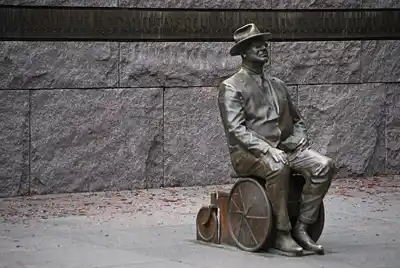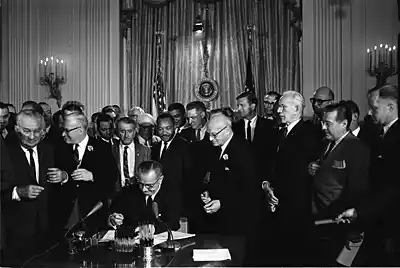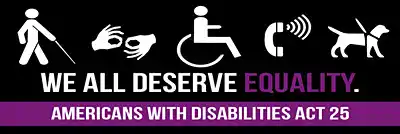History of Disability in America
Attitudes towards and support for those with disabilities has been an evolving process in the United States
Author Attorney Greg Reed:
Disabilities often make it more difficult to navigate the world. Blindness, deafness, and disabilities that cause limited mobility can make it extremely difficult to lead a normal life. While it would be nearly impossible to remove all the barriers disability creates, modern society has come a long way towards building a more accessible world. American history shows a clear narrative moving from isolating and institutionalizing disability to accepting the disabled and allowing them to contribute and have a voice in their community.

When Franklin Delano Roosevelt, who suffered from polio himself, signed the Social Security Act into law, it was a landmark moment. While the original program only supported the elderly and not the disabled, it represents a paradigm shift towards compassion for those unable to work.
In the 1600s, while America was being colonized, if someone became injured or ill, or required care and couldn’t work, they would be sent back to England.
Additionally, it was expected that the disabled person’s family would bear the burden of support. Many colonies enacted laws to help provide for those with disabilities. The laws varied greatly, but generally were focused around helping residents and excluding outsiders. Some villages would circumvent the laws by carrying disabled people outside of the borders of the town in the middle of the night so they would be outside the village’s jurisdiction.
Almshouses were early institutions to help care for those who were unable to care for themselves.
Almshouses were the predominant method of taking care of the disabled until the mid-20th century. Early colonies would institutionalize anyone they categorized as “undesirable” in these facilities. Someone who had become injured or ill through no fault of their own would often be institutionalized alongside petty criminals. Almshouses provided minimal care and were unclean and overcrowded even by the standards of the day.
While it’s taboo today, eugenics was a popular philosophy in the early 20th century.
Now we understand that a disability in one area does not mean an inability to contribute. Stephen Hawking, Helen Keller, and John Nash are among the most inspirational examples of how those with disabilities can still make great contributions and are refutations to the ugly idea of eugenics. Unfortunately, in the early 1900s, eugenics was used to justify minimal care, poor treatment, and even abuse (including involuntary sterilization) toward those with disabilities.

Disabilities often make it more difficult to navigate the world. With the help of people like FDR modern society has come a long way towards building a more accessible supportive world for the disabled.
Conditions for the disabled began improving in 1935 with the passage of the Social Security Disability act.
Before the act, people were expected to take of themselves or have family to take care of them if they could not provide for themselves in old age. At first, Social Security only provided for the elderly, but the act sparked discussion in congress about how to care for the disabled. When Franklin Delano Roosevelt, who suffered from polio himself, signed the Social Security Act into law, it was a landmark moment. While the original program only supported the elderly and not the disabled, it represents a paradigm shift towards compassion for those unable to work.
Further progress for Americans with Disabilities
As discussed in earlier, Franklin D. Roosevelt created the Social Security program in 1935. The program didn’t provide support to the disabled, but it helped set an important precedent. Prior to this time, those with disabilities would be institutionalized under unacceptable conditions. Social Security was a turning point in how those who could not work were treated. Many cultural trends from the 30s through the 90s culminated in better treatment for the disabled.

The 1964 Civil Rights Act, originally enacted to protect minorities and women, was eventually expanded (in 1990) to prohibit discrimination against those with disabilities.
In the late 1930s, civil rights movements, technology and culture all made positive changes for the disabled.
The League of the Physically Handicapped was established in New York in 1935. The organization fought to include disabled Americans in Roosevelt’s jobs programs. Around this time, the folding wheelchair was invented. The technology helped disabled people access opportunities they could not before. In the cultural sphere, Ray Charles and Lou Gehrig were gaining popularity for overcoming their handicaps.
Eugenics was a popular philosophy in the early 20th century, but after the World Wars, it became clear that perspective was not the appropriate way to treat those with disabilities.
When the disabled and injured were the heroes who fought in the wars, it was harder to justify poor treatment. It is well known the Nazis were proponents of eugenics and the philosophy fell out of favor after World War II.
In the 1950s and 60s, significant progress was made for the disabled.
Veterans disabled in the war formed strong political organizations. In 1950, the Social Security program was expanded to provide for those over 50 who were disabled; by 1960 the age requirement was removed and any permanently disabled American could receive benefits.
During this time, civil rights movements for women and African Americans were shifting perspectives towards a more inclusive society.
The 1954 case Brown v Board of Education famously desecrated schools, but also set a legal precedent which lead to the mentally handicapped being able to attend school in the 1970s. Similarly, the 1964 Civil Rights Act, originally enacted to protect minorities and women, was eventually expanded (in 1990) to prohibit discrimination against those with disabilities.

1968 was the year of the first Special Olympics.
In 1968, the year of the first Special Olympics, the Architectural Barriers Act was passed.
This act set the precedent for modern accessibility laws. The Architectural Barriers act mandated that any building constructed with federal funds (including many post offices, libraries, and museums) would be accessible to the handicapped.
The 1970s saw many more advancements for the disabled. In 1973, any institutions receiving federal funds were prevented from discriminating on the basis of disability.
In 1974, the last of the so-called “ugly laws” was repealed. “Ugly laws” were laws that made it illegal for people with obvious physical deformities from appearing in public. The concept of a law preventing someone from appearing in public because of their appearance is odious to modern sensibilities, but in early America, many places had such laws.
In 1980s (the International Decade of Disabled Persons), civil rights continued to expand for the disabled community.
Many organizations for the disabled began in the 80s, including National Council on Independent Living, World Institute on Disability, Job Accommodation Network, and The Society for Disability Studies. Federal laws were passed helping the disabled gain access to housing and transportation.

The ADA has been a monumental victory for those with disabilities. The new law requires places of business to accept the disabled as workers and customers. The disabled were now seen as people to be included, rather than isolated and institutionalized.
By the 90s, disability no longer meant being confined to an institution.
The disabled were able to live on their own with Social Security Disability Insurance, able to communicate with through technologies such as closed captioning and braille, and exerting more political influence than ever before. In 1990, George Bush signed The Americans with Disabilities Act into law.
The Americans with Disabilities Act extends the protections of the Civil Rights Act to the disabled.
The law has 5 different “titles” or sections:
1) Employment
- Disability joins race and sex as a class protected from discrimination
- Employers are required to provide “reasonable accommodation” for the disabled
2) Public Services
- Government cannot discriminate on the basis of disability
- Governmental services and programs must include accommodation for the disabled
- Public transit must be accessible to the disabled
3) Private Services
- “Places of public accommodation” (Stores, hotels, restaurants, etc.) cannot discriminate on the basis of disability.
- “Places of public accommodation” must make reasonable modifications to serve people with disabilities and communicate with visually or hearing impaired individuals.
4) Telecommunications
- Telephone companies are required to provide relay services to help those with hearing and speech disabilities communicate.
- Federally funded public service announcements are required to have closed captioning
5) Miscellaneous
- The ADA does not override existing laws
- This title lists conditions not considered disabilities, including sexual behaviors and illegal drug use.
- The ADA cannot be used to claim reverse discrimination (i.e., someone saying they were discriminated against because they do not have a disability.)
The ADA has been a monumental victory for those with disabilities. The new law requires places of business to accept the disabled as workers and customers. The disabled were now seen as people to be included, rather than isolated and institutionalized.
Even today, the program FDR helped established is the primary source of support for those who have become injured or ill and are unable to work. If you have become injured or ill, you may be eligible for Social Security Disability Insurance. If you have been denied disability, an experienced disability lawyer can help appeal your disability claim. The attorneys at Bemis, Roach and Reed can help you with your claim. Call today for a free consultation. Call 512-454-4000 and get help NOW.
Try these links for further reading on this subject:
I Just Became Disabled – What Should I Do First?
The Ticket to Work Program
Medicaid and Social Security Disability
Author: Attorney Greg Reed has been practicing law for 29 years. He is Superlawyers rated by Thomson Reuters and is Top AV Preeminent® and Client Champion Gold rated by Martindale Hubbell. Through his extensive litigation Mr. Reed obtained board certification from the Texas Board of Legal Specialization. Greg is admitted to practice in the United States District Court - all Texas Districts and the United States Court of Appeals-Fifth Circuit. Mr. Reed is a member of the Travis County Bar Association, Texas Trial Lawyers Association, past Director of the Capital Area Trial Lawyers Association, and an Associate member of the American Board of Trial Advocates. Mr. Reed and all the members of Bemis, Roach & Reed have been active participants in the Travis County Lawyer referral service.

![]()
Your Free Initial Consultation
Call now:
At Bemis, Roach and Reed, if we can't help you, we will try to find the right attorneys for you.
We offer each of our prospective clients a free no obligation one hour phone or office consultation to see if we can help you and if you are comfortable with us. We know how difficult a time like this can be and how hard the decisions are. If we can be of assistance to you and help you find a solution to your issue we will, even if that means referring you to another attorney.
Let's get you Started:
If you could provide us with some basic information about your claim we will get right back with you with a free case evaluation and schedule your Free Consultation Today.
You can also email us at: contact@brrlaw.com
Kind Words from Our Clients
“The attorneys and staff at Bemis, Roach & Reed have provided me and my husband, Jeff, with stellar advice, care, and service. They made navigating the SSDI process easy, painless, and as timely as possible. During this difficult time in our lives it was a tremendous relief to know they were on our side and keeping us updated on next steps and timelines. We also had questions about my husband’s long term disability insurance and they helped us get those questions answered and resolved without any additional fee. I highly recommend Bemis, Roach & Reed.” – Kelli G
“I needed a lawyer for my case and had googled best lawyers. They came up first on my list and decided to give them a call. From the moment I called I knew I chose the right people. They said they would fight for me and fight they did. They knew what they were doing and kept good communication throughout the process. If you need someone that will listen, understand, and fight then these are the people. HIGHLY RECOMMEND.” – Marcel L.
“I’ve had a great experience working with Bemis, Roach & Reed for my disability case. I spent two years fighting on my own, until I was informed to look for a disability lawyer. Right away, sending in questions was a breeze, and from the moment my case was accepted, everything became a major weight off my shoulders. My newest appeal was filed for me, my medical records and case history sorted for me, and I could finally focus on my appointments and treatment with a little less worry. Everything was explained to me in a way that made sense, the process was set out in an easy to understand way. And, just like that, at the beginning of July 2023, my claim was accepted!” – Sunshinemutt






